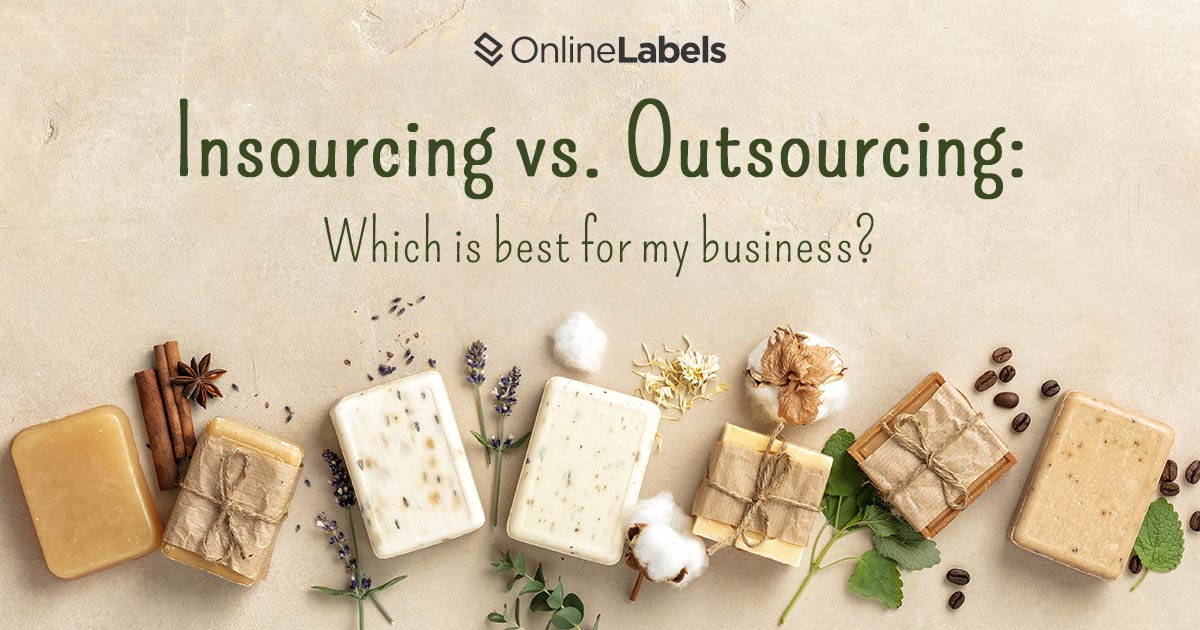Insourcing vs. Outsourcing: Which Option is Best for My Handmade Business

Over the last ten years, there have been a lot of shifts in the workplace, and we have the growth of the digital world to thank for that. It’s allowed businesses to expand and hire in ways they may not have known or considered before.
As a business owner, you can hire as much or as little help based on your current needs and budget. You can hire someone as a full-time employee who works in-house or remotely, or contract a company or vendor just to get you through a current project. With many choices to consider, the decision on insourcing vs. outsourcing is not often an easy one. But when there are increases in demand and your business is growing, it’s time to take that next step.
If you’ve already decided it’s time to expand your team but unsure which avenue is best, you’ve come to the right place. Let’s start with defining insourcing and outsourcing.

What is insourcing? Insourcing is when a business assigns a specific project or task to a person or team within the organization—oftentimes, requiring the business to hire and expand, either to take on those business functions or fulfill the work of those getting promoted. These hired professionals typically work in-house alongside your current team and become a part of your payroll.
What is outsourcing? Outsourcing, as you may have guessed, is just the opposite of insourcing. It’s a practice in which the business acquires the services of an outside third-party, whether that be another organization/vendor or freelance individual to handle specific tasks or projects for the business.
Both options are an investment into your business, bring value, and can help you scale. However, one sourcing solution may turn out to be more effective than the other pending where you currently are in your handmade business journey. To help you determine which is best for you right now, we’re discussing what each of these sourcing solutions brings to the table and what they lack.
Pros and Cons of Insourcing
Pros
Better quality control: Insourcing lets your team work together (and likely under one roof), where you’ll be overlooking their decision-making progress. You’ll have complete control over business activities and projects so you can pivot and make any necessary changes to ensure the quality of your product, at any time.
Ideal business communication: Insourcing makes collaborating and communicating a breeze because the team is working the same business hours and under the same roof. They’re more available for face to face meetings or video calls, to travel and coordinate events and pop-ups together, etc.
Increased company culture, trust and relationships: This one goes hand and hand with the communication. An employee working in the office with you is spending more time with you and your team, and learning (or knows and appreciates if they were already on the team) the company culture and values. They love and strive for your business the way you do because of the relationships they’ve made.
Cons
More expenses: Choosing to insource usually means more expenses. Aside from a consistent hourly wage or salary, screening and training cost money. You’ll also have to consider the costs of new equipment, and benefits such as PTO, health and dental insurance.
More time training: Whether you’re hiring from within or bringing on a new employee, someone (or you) will need to dedicate ample time to train and bring this person up to speed.
Pros and Cons of Outsourcing
Pros
More cost effective: Outsourcing eliminates the time and money you would dedicate to onboarding a new employee, including their part or full-time hourly wage or salary, equipment, benefits, etc. The company or individual you choose to hire is already trained and equipped with all of the resources for the work you’re hiring them to take on. The biggest benefit to this pro? You determine the scale at which you hire them. You can hire them on a project basis, for 10 hours a week or on a longer contract basis.
Leans on external expertise: Whatever business activity or task you decide to outsource, there is a third-party company that specializes in exactly that. They have the necessary expertise, tools, and experience to deliver.
Focus on core business activities: Since your third-party company or individual assumes responsibility for tasks you’ve outsourced to them, you can focus on the main function of your business and tasks you enjoy most.
Cons
Quality control is limited: Though you’re hiring a company that specializes in the work they’re taking on, you won’t be there to communicate on every step of the process and to oversee everything. You’ll have to trust your partner and their team.
Potential communication barriers: With outsourcing, you typically have one point of contact (POC) who coordinates with any of the different team members working on your project. Your POC will act as the project manager and be responsible for ensuring all of the team members are meeting your standards and expectations. If the company/vendor you decide is the right fit is located in a different country, you’ll likely be operating in different time zones and may even have a language barrier.
Ask Yourself These Questions
After comparing both sourcing options, you may still be undecided. Take some time to discuss with other small business owners to find out what they did when they faced this decision. Then, ask yourself a few questions that’ll help make the decision clearer.
Are your needs urgent? If you and your current team are maxed out and it’s requiring you to turn down events or temporarily close your Etsy shop, outsourcing is probably the best option for you right now. However, if you have a little more time and room in your budget, insourcing may prove to be the better investment.
What business activities do you plan to hand over and do you have the resources to do so? Do you have processes streamlined and documented for this position or project? If your tasks require some expertise that doesn’t fall into your business’s skill set or resources, it’s best to let pros tackle it.
Is it necessary for the quality of the product or growth of your business to oversee this operation? If the answer is yes, insourcing is the sourcing solution for this need. If you don’t need to have a part in this task, we vote to outsource and save a bit of the budget.
If your business is growing and you’re looking to expand your team, we hope this article was helpful for you and gets you started in a direction.
Ever thought about outsourcing your label printing? With custom labels, you get professional-quality labels without the hassle of printing them yourself.
Want more tips and professional advice for running your business? Check out our small business resources.



